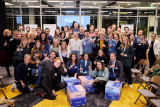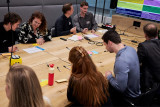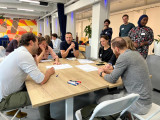Within the scope of my studies I am looking for an Internship (up to 6 months) in the field of Sustainable Urban Planning; Green Cities; Sustainable Societies from November 2017 on. Currently, I am studying ‘Global Studies’ (MA) at the University of Gothenburg, Sweden with a focus on the field of ‘human ecology’ – a broad domain which initially engages in researching the impact of human societies on nature (anthropogenic environmental change) and which involves concepts/approaches on how to challenge a human-based world-view and how to make our societies more sustainable to change/transform this world-view and create more sustainable societies in the future. I very much focus on local sustainable development in terms of "green urbanism" (ecological&urban can go together) i.e. adaptation strategies of local communities to climate change which preferably involve urban planning/creating green spaces in urban areas (urban gardening/community gardens);behavioral change i.e. 'nudging' people into thinking about how they themselves could do something good for nature in their daily life's (take the bike to work/buy less meat/recycle/install solar panels/challenge food waste) as well as the possibilities of establishing and support local agriculture which enables a certain food security and sovereignty.
Amsterdam City seems to be very progressive when it comes to Sustainable Urban Planning and I would very much like to be a part of it for some time (during my internship), but could also imagine to make Amsterdam a long-term living option. Since there exist so many networks and organizations and collaborations in Amsterdam regarding my chosen field I am a bit lost and would appreciate it if you would help me out!
Thank you!
Want to receive updates like this in your inbox?
Get notified about new updates, opportunities or events that match your interests.
Maybe you will also like these updates
Recap of Demoday #22

On Thursday December 14th, Amsterdam Smart City partners concluded 2023 with an afternoon full of inspiration, exchange and connections at our 22nd Demoday! Our partner Deloitte welcomed our network in The Garage, where their ‘Deloitte Studios’ department is located. In this article, we’ll give you a quick overview of the Knowledge Session, Work Sessions and Pitches. Interesting in learning more? Read the full reports by our Programme Managers Noor, Pelle and Sophie (linked below).
About our Demodays
The Demodays are one of the tools we use to stimulate innovation and encourage connection between our partners and community. The purpose of the Demodays is to present the progress of various innovation projects, ask for help, share dilemmas and involve more partners to take these projects to the next level. More information about the Demodays can be found here.
Knowledge Session: Change in the here and now, with Theory U
To kick-off our final Demoday of 2023, our brand-new partner Hieroo led an inspiring knowledge session about the change method they use for social innovation in the city: Theory U. Dorien Schneider and Maartje Krijnen taught us more about this methodology and how it can help us solve complex problems by shifting from ego to eco-thinking. Read the full report here.
Work sessions
After the plenary Knowledge Session we split up in different worksessions, each exploring regional innovation challenges. As always, we had set up the sessions’ topics and moderation in collaboration with our partners.
Mobility | Decision-making along the principles of Inclusive Prosperity – Jurhan Kwee (Municipality of Amsterdam)
In The Netherlands, the concept of ‘Inclusive Prosperity’ is on the rise. Policy makers are busy defining this concept, figuring out how to put this concept into practice and what it means for their decision-making process. Together with his colleagues at the Municipality of Amsterdam, Yurhan Kwee hosts sessions on decision-making along the principles of Inclusive Prosperity. With the input he gathers, he hopes to make the decisions needed for our Inclusive Prosperity ambitions more understandable and transparent, both for Amsterdam’s administrators and councillors as well as its citizens. Read Pelle’s recap article here.
Digital | Data Commons Collective: Using data for a liveable city – Lia Hsu (Amsterdam Economic Board) and Simone van der Burg (Waag)
In the big tech-dominated era, data has been commercially exploited for so long that it is now hard to imagine that data sharing might also benefit the community. Yet that is what a collective of businesses, governments, social institutions and residents in Amsterdam aim to do. Sharing more data to better care for the city. On behalf of the Data Commons Collective, Lia Hsu (Strategic Advisor at Amsterdam Economic Board) asked the Amsterdam Smart City network for input and feedback on their Data Commons initiative. Read Sophie's recap article here.
Energy | How can we continue to facilitate the homeowner in driving the energy transition? | Wouter van Rooijen (Alliander)
Wouter van Rooijen (Alliander) discussed the challenges related to grid congestion. From 2030 onwards, it is expected that a significant portion of the low-voltage network will experience both over- and under-voltage. While the network will be reinforced as quickly as possible, the lack of labour capacity is also prompting the consideration of alternative solutions.
The solution that emerged from Wouter's co-creation process was WijkWise. In this work session, Wouter aimed to validate the WijkWise concept and find parties that could contribute to its development and market implementation. Dave van Loon from Kennisland moderated the session. Read Noor’s recap article here.
Circular | Navigating eco-emotions: The impact of working in sustainability on your mental wellbeing| Marian Zandbergen (Hogeschool van Amsterdam)
This work session, led by Marian Zandbergen (CIRCOLLAB, HvA) and moderated by Mareille de Bloois (Royal HaskoningDHV), explored the challenges and opportunities associated with eco-emotions, both personally and within organizations. The key question addressed was: How can individuals and organisations constructively manage eco-emotions, and what implications does this have for organisations? Read Noor’s recap article here.
Pitches
To end this festive afternoon and the year 2023 as a whole, we invited project owners and -members to present their progress and next steps on topics brought in during our events and deep-dives throughout 2023. The following projects were presented. You can read more about these topics on their dedicated articles and project pages, linked below.
Local Energy Systems: Where we started, what we have achieved, and what are the next steps – Omar Shafqat (University of Applied Sciences Amsterdam)
Connecting the resource- and energy transition – Edwin Oskam (MRA)
ChatGPT and the government: Possibilities and impact on our work – Jeroen Silvis (Province of North Holland)
Floating urban districts: Future-proof living in the Metropolitan Region – Joke Dufourmont (AMS Institute)
Mobility Justice: Raising the topic of Mobility Poverty and the working group’s progress – Bas Gerbrandy (Province of North Holland)
Our next Demoday will take place in April. Do you have an inspiring story or project you want to pitch to the Amsterdam Smart City network? Let us know via sophie@amsterdamsmartcity.com
Demoday #22: Inclusive Prosperity & The Case Of Experiments In Public Space

*This article makes use of the term Inclusive Prosperity as the English translation for the Dutch word; ‘Brede Welvaart’
In The Netherlands, the concept of Inclusive Prosperity* is on the rise. Policy makers are busy defining this concept, figuring out how to put this concept into practice and what it means for their decision-making process. Together with his colleagues at the Municipality of Amsterdam, Yurhan Kwee hosts sessions on decision-making along the principles of Inclusive Prosperity. With the input he gathers, he hopes to make the decisions needed for our Inclusive Prosperity ambitions more understandable and transparent, both for Amsterdam’s administrators and councillors as well as its citizens.
Inclusive Prosperity
Inclusive Prosperity is about more than just money. It involves everything that people consider valuable, such as health, the quality of education, the environment, a safe living environment, and equal opportunities for everyone. It's about the quality of life in the present, and the extent to which this affects the prosperity of future generations or those of people elsewhere in the world.
According to the definition, used by the Municipality, there are 8 themes to consider:
1. Subjective Well-being
Subjective well-being refers to the evaluation people make of their lives. Consider the question, "How satisfied are you with life in general?"
2. Health
The theme of Health encompasses physical illnesses and conditions, as well as mental health, living with limitations, perceived health, and self-regulation and resilience.
3. Consumption and Income
The theme of Consumption and Income refers to how income provides people with the freedom and opportunities to consume, including purchasing services and goods, maintaining a financial buffer, and shaping one's lifestyle.
4. Education and Training
Thinking about the theme of Education and Training involves the transfer of knowledge and skills, socialization, and considering the education or training experiences of individuals.
5. Spatial Quality and Cohesion
Regarding the theme of Spatial Cohesion and Quality, consider the following: a qualitatively well-designed space is a crucial precondition for the perceived broad prosperity. This includes spatial design on a functional level and with a focus on the future.
6. Economic Capital
Depending on the case, consider how it relates to:
- Human capital: the combination of competencies, knowledge, and skills;
- Physical capital: material possessions, such as machinery, buildings, and infrastructure;
- Knowledge capital: intangible assets, such as research and development, data, and patents;
- Financial capital: the financial resources of households and the government (purchasing power).
7. Natural Capital
Natural Capital refers to the stock of natural resources. Consider items such as (drinking) water, food, minerals, wind-sun-water energy, biodiversity, etc. Assess whether they are sufficiently available, in shortage, or if there is damage to these resources.
8. Social Capital
The concept of Social Capital often refers to the benefits of social networks, such as access to information and resources. This involves connections within and between groups. Positive effects can lead to trust, while negative effects can lead to loneliness.
Experimenting (with Mobility related policies) in public space
The case we used during this session is the use of experiments in public space, altering mobility or travel infrastructure. The months leading up to this afternoon, Amsterdam had put different experiments into practice (e.g. de ‘knip’ and de ‘paaltjesproef’) resulting in heated discussions, about both the success and desirability of using this method.
In a more objective manner, we used the Broad Prosperity principles to argue why its either desirable or undesirable to put such methods into practice.
Results
The group agreed that these Amsterdam experiments, concerned with creating calmer, more liveable urban areas, score well within themes like; Health (less air & noise pollution), Nature (more space for green and biodiversity), Social capital (more space and opportunity to meet and interact), Spacial quality (less dangerous and more moving space) and education (experimenting, learning by doing, viewing urban planning as experimenting and an ongoing learning process). However, as this year’s backlash on the experiments showed, there are some negative aspects to consider. Examples of domains in which we found some negative aspects, were; Economy (decreased speed and efficiency), Consumption & Income (local shop- and restaurant-owners need to be flexible and could be victims of changing infrastructure) and Subjective Well-being (citizens feel used, disadvantaged, and there is ambiguity about the purpose).
We found it difficult to arrive at a common answer because advantages and disadvantages exist on each theme separately. However, there was a common notion that the success of this method is rooted in clear and transparent communication on the effects and goals of such experiment. Frustration should be minimized and the opposing arguments should be taken seriously. Furthermore, we discussed the difference between a ‘real’ experiment in which every outcome is a success, and a trial, which is used to test a policy that’s envisioned for future years. The one who initiates the experiment should have this very clear for itself.
While one of the strengths of this method is the need to value these different domains in a more equal and objective manner, it proved to be difficult in practice. We all had the tendency to give some aspects more weight than others. While we were supposed to set up an advice and practice with decision-making along the principles of Inclusive Prosperity, it turned out to be challenging to let go of our prior experience, prejudices and opinions on this subject. We weren’t sure whether this is always a negative thing, but it’s one of the considerations Yurhan took home in the Municipality’s exploration of this approach.
Together, we experienced the challenge of working together with a new concept and approach. It should be an ongoing practice and discussion, a collective effort. Sessions like these serve that purpose perfectly.
Feel free to get in touch with me if you want to know more about the municipality’s and Amsterdam Economic Board’s efforts on the topic of Inclusive Prosperity.
Demoday #20: Knowledge session ‘Power in Transitions’

When working together on transitions, it is important to be aware of and sensitive to the impact of power and systemic oppression in participatory processes. Within the Amsterdam Smart City network, the question of inclusion and civic participation, is often brought up in worksessions and discussions. However, we often lack the tools to find the bottlenecks and really include all important beneficiaries.
Therefore, we asked our valued partners Kennisland and DRIFT to lead a workshop about Power in Transitions at Demoday #20 on May 16. Dave van Loon and Faduma Mukhtar (Kennisland) together with Aron Teunissen (DRIFT) taught the participants more about power in transitions, based on the Power Literacy Framework and Field Guide from Kennisland. This guide describes five different forms of power and offers a set of tools for professionals to become more aware of power dynamics in their work.
The five forms of power
According to the Power Literacy Guide by Kennisland, there are five forms of power in design process. If you want to learn more about this, you can download the Power Literacy guide here. The five forms of power are:
Privilege: The type of power you get from a social relation whereby you benefit due to the social group you belong to, at the expense of another social group. It is an unearned advantage and often invisible to those who have it.
Access power: The ability to influence who is included in and excluded from the design project and process.
Goal power: The ability to initiate the design project to begin with, as well as the ability to influence decisions related to framing the problem, goals, and structure of the design process.
Role power: The ability to influence the roles that different stakeholders take on. This includes the ability to assign any roles or titles in the design process, as well as influencing the role each stakeholder plays in making decisions.
Rule power: The ability to influence the way that those in the design process will work together. It includes the ability to influence what is considered normal, what is allowed and what isn’t, how actors will communicate with each other, what language is used, and beliefs about what types of knowledge are valid.
Power check
After a theoretical introduction of the five forms of power, we split into smaller groups to perform a so-called power check for different Amsterdam Smart City projects, such as the Mobility Challenge and “Wat mensen beweegt”. Using this power check, the participants looked at access power and goal power. We identified all actors affected by the project and indicated which actors were not involved. The different actors were then assigned a role in different stages of the process: listener, co-creator, advisor, partner or director.
Most important take-aways
The goal of this exercise was to create more awareness about involving target groups in different stages of the project. The main take-aways were:
The role for the for the ‘benefit group’, the people that are impacted by the project, is often too small. If beneficiaries are involved, this often happens in the last stages of the project. In this phase in the project, it is often more difficult or not possible at all to influence decision-making;
To create equal power, some parties have to ‘give away’ (some of) their power;
Truly inclusive work takes time, effort and money. It is not something takes place overnight;
Awareness is half of the battle: make the topic of systemic oppression in participatory process a structural part of your (work)process).
Want to learn more about power in transitions? Read more.

